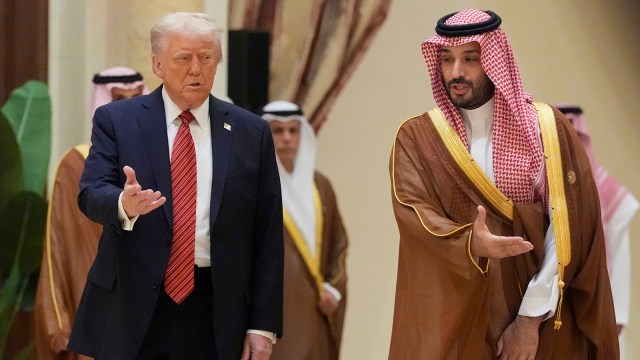
Written by Prasanta Kumar Pradhan
US President Donald Trump’s visit to Saudi Arabia, Qatar and the UAE took place at a critical juncture amid the ongoing Israel-Hamas war, regime change in Syria, uncertainty surrounding negotiations with Iran over its nuclear programme, and the persistent crises in Yemen and the Red Sea region. During his engagements with these influential and economically powerful Gulf States, Trump emphasised key strategic priorities, including trade, investment, defence cooperation and regional stability.
Trump and MbS – a renewed partnership
As part of a significant initiative to enhance bilateral trade and investment, the US and Saudi Arabia signed a Strategic Economic Partnership Agreement, which includes MoUs in key sectors such as energy, mining and defence. The agreements collectively amount to approximately $300 billion. Saudi Crown Prince Mohammed bin Salman highlighted that 40 per cent of the investments made by Saudi Arabia’s Public Investment Fund are directed toward the US, underscoring the depth of economic interdependence between the two countries.
During Trump’s first term, there was close cooperation between Trump and Mohammed bin Salman. The Biden administration adopted a critical stance toward Saudi Arabia, especially over its military intervention in Yemen against the Houthis. Biden also imposed restrictions on arms sales to Saudi Arabia. With Trump back in the White House, the US-Saudi bilateral relations are expected to grow.
Defence deals in Qatar, civilian honours and investment in UAE
In Doha, the US and Qatar signed a defence agreement under which the US will supply MQ-9B unmanned aerial vehicles and FS-LIDS air defence systems to Qatar. Qatar Airways and Boeing concluded a landmark deal valued at approximately $200 billion for the purchase of 160 aircraft, marking the largest single order in Boeing’s history. Qatar continues to serve as a critical strategic partner for the US in the region. In recognition of this role, the US designated Qatar as a Major non-NATO ally in January 2022. Furthermore, the US is actively engaging with Qatar on efforts to secure the release of Israeli hostages held by Hamas, given Qatar’s key role as a mediator in the ongoing war.
The UAE has pledged to invest $1.4 trillion in the next 10 years in crucial fields such as AI, semiconductors, energy and manufacturing. Both countries signed a number of commercial agreements worth $200 billion, including the purchase of 28 Boeing aircraft powered by GE engines by Etihad Airlines. After Trump announced the lifting of sanctions on Syria, UAE-based DP World signed an MoU with the Syrian government worth $800 million to develop the port of Tartus, which used to be a vital logistical hub for the Russian military during the Assad regime. UAE also conferred “Order of Zayed” – UAE’s highest civilian honour on Trump.
Trump’s US isn’t retreating from West Asia
Despite ongoing discourse regarding a possible US retreat from West Asia, Trump’s visit to the Gulf reaffirmed the strategic significance of the region for the US and dispelled the narrative of American disengagement. Trump continues to engage with all the major regional stakeholders – Iran, Arab states and Israel. While expressing continued support for Israel in its war with Hamas, his administration is also pursuing dialogue with Iran concerning its nuclear programme. Simultaneously, Trump has deepened relations with Arab states through initiatives focused on trade, investment, regional security and defence cooperation.
The Syria and Iran U-turn
One of the most important developments during Trump’s visit to the Gulf was his meeting with the new Syrian leader, Ahmed Al Sharaa, in Saudi Arabia and his announcement of the lifting of US sanctions on Syria. Trump also encouraged Al Sharaa to consider joining the Abraham Accords, a move that could have far-reaching implications for the geopolitical landscape of the region. Historically, Syria has aligned closely with Russia and Iran, particularly under the Assad family rule. By lifting sanctions and signalling a willingness to engage with the new leadership in Damascus, the US intends to bring Syria into its sphere of influence in the region. This strategic realignment will have implications for Israel, as Syrian territory was used to launch attacks on Israel.
Maintaining a firm stance toward Iran, Trump declared at the US–Gulf Cooperation Council summit in Riyadh that Iran “must stop sponsoring terrorism and halt its bloody proxy wars.” He further emphasised that the US would not permit Iran to develop a nuclear weapon. In response, Iranian Foreign Minister Abbas Araghchi dismissed Trump’s statements as “deceitful.” However, while in Doha, Trump adopted a more conciliatory tone, expressing his optimism over the renewed nuclear talks with Iran. He appealed to Qatari Amir Sheikh Tamim bin Hamad Al Thani to leverage Qatar’s diplomatic ties with Tehran to facilitate a potential agreement.
Under Trump, there has been a discernible shift in the US policy toward West Asia, marking a departure from the approach taken by the previous administration. While President Joe Biden confronted Houthi forces in the Red Sea and faced challenges in Syria, the Trump administration has reoriented American engagement in the region. Notably, shortly before Trump visited the Gulf, the US agreed to a ceasefire with the Houthis and, in Riyadh, met with the new Syrian president, Ahmed Al Sharaa, who was designated as a terrorist by the US. The visit reaffirmed the American economic interests in the Gulf and its role as the principal security provider in the region amid ongoing regional tensions. Trump’s strategic outreach to Syria and Yemen, coupled with efforts to expand the Abraham Accords, reflects his interest-driven approach aimed at maintaining American influence on the regional order in West Asia.
The writer is a Research Fellow and Coordinator, West Asia Centre, Manohar Parrikar Institute for Defence Studies & Analyses, New Delhi. Views expressed are personal